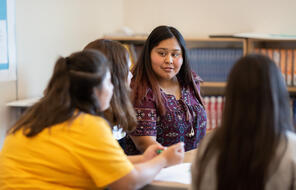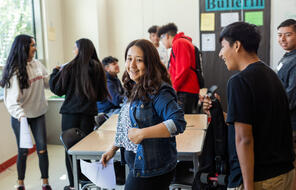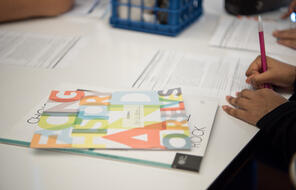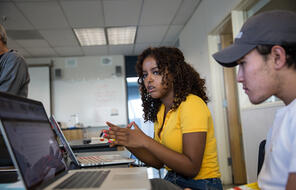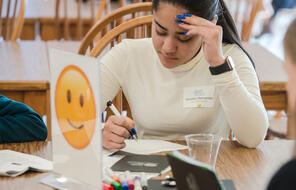Is It Kay?
At a Glance
Language
English — USSubject
- English & Language Arts
- Social Studies
- Culture & Identity
Is it Kay? By Ka’Isis Lee 1
Ever since elementary school, I’ve always dreaded the first day of school. Not because, “Oh no! new teachers!” - or - “Prepare for all nighter essays again…” No, I could handle that. I’ve always dreaded the first day of school simply because I knew that in every classroom I entered, the teacher inside would reach a certain point on the student list where the last names that begin with K and L met. I would know exactly when they got to that point because of their hesitation and the resulting dead silence in the room.
“I go by ‘kay” is what I learned to say. Now, I say it before they even try to pronounce it.
My real name is
K-A-apostrophe /’ -CAPITAL “i” NOT A “L” -S-I-S
KA’ISIS pronounced: KAY-ISIS
Think of how many teachers you’ve had in your lifetime. Even if you’ve only attended one school your whole life, you meet at least four new teachers every year. As someone with anxiety that becomes heightened in new environments, sitting through hundreds of sessions of teachers trying to figure out the best way to say my name feels ten times worse than it should. No, it doesn’t help that I have social anxiety…no it doesn’t help that I’m a person of color…and it definitely doesn’t help that I have a naturally quiet voice.
So… whenever I tried to correct a teacher, the two possible outcomes of verbalizing this correction would, without exception, be:
Me: It’s pronounced “kay-isis”
Teacher: kayesis?
Me:...yeah
-OR-
Me: it’s pronounced “kay-isis”
Teacher: you need to speak up I can’t hear you
Then, I’d be too scared to continue trying - so I’d just let it go
IT’S NOT that I necessarily wanted to give up in those situations, but the awkward and embarrassing interactions were so intense and stressful for me that I would rather just drop the subject than to continue in that state of anxiety. I mean, it is calling for attendance after all. When the teacher calls your name, all the attention is on you - and I did not want to further extend the amount of time all of the focus was on me.
This is why the first day is agony for me. I know, at the beginning of the day, that when I walk into these new classrooms all I’ll remember is the way the teachers said, “kalysis?...kahsis?...kaysis? -
As if they’re asking a question?
Making me feel like my name is a question?
Make me feel like my existence is questionable?
If you have a question about how to pronounce my name, the question should sound something like this - “How do I pronounce this?”
Over the years, I simply got tired of it. Tired of the disrespect. Tired of the disregard. Tired of the lack of effort. Tired of the lack of empathy.
I remember when a teacher did not feel the need to try and learn my name. Instead, she gave me the nickname “kay” - because kaisis was just too hard for her. She never asked if that was okay with me, but whatever makes them feel better, right?
So I started going by “kay.”
It was a lot easier and less stressful to tell someone you go by “kay” that it was to try to get them to pronounce Ka’Isis correctly. I never really chose this name for myself - but I guess it’s mine now.
I liked it for a while when my friends called me “kay,” because it’s like a cute little nickname and I don’t know what other nickname you’d get from Ka’Isis. Definitely not “Isis” - I’ve been bullied enough about that one. But when teachers and adults call me that, it reminds me that I’m not Ka’Isis. For a period of time, I would even forget that Ka’Isis was my real name - until we had a substitute teacher.
Ka’Isis, to me seems, to be gone.
“kay” bends and twists herself into whatever other people want and over the years I’ve learned people like “kay” more than Ka’Isis…and maybe that includes me too.
- 1Ka’Isis Lee, “Is it Kay?,” in Black Girl, White School: Thriving, Surviving and No, You Can't Touch My Hair. an Anthology, ed. Olivia V.G. Clarke (Columbus, OH: LifeSlice Media, 2020), 9-11.


